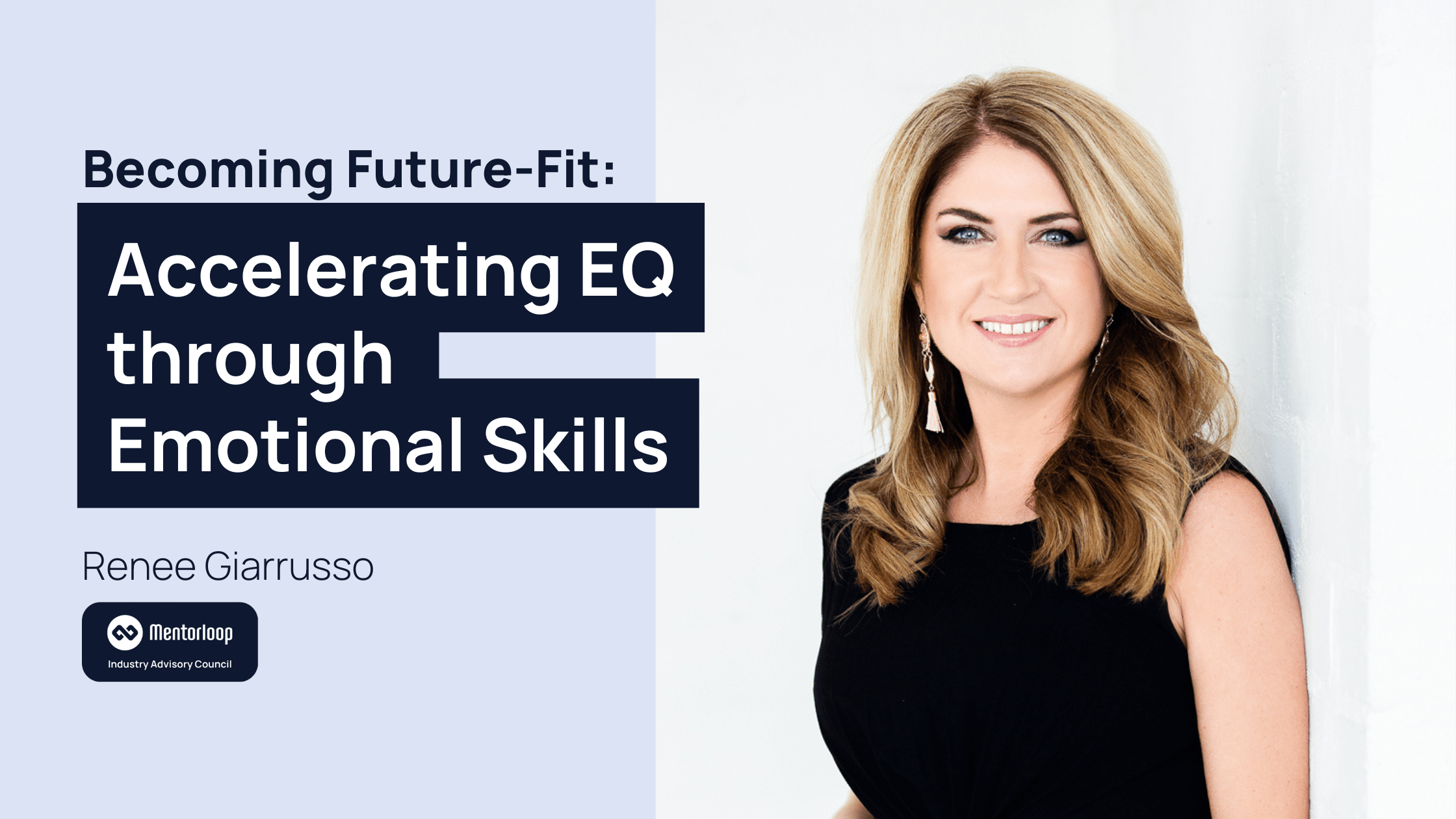
Award-winning leadership, communication, and mindset expert and Mentorloop Industry Advisory Council member, Renee Giarrusso—founder of RG Dynamics and Limitless Leadership—shares her insights on why developing EQ through gaining emotional skills is the most crucial competency in today’s world of work.
Understanding Soft Skills and Emotional Intelligence (EQ)
Soft skills, or emotional skills, define how we engage with others. These include leadership, communication, critical thinking, and problem-solving, to name a few. These and other cognitive and socio-emotional skills play a role in shaping emotional intelligence (EQ), which is foundational for professional and personal success. But what is EQ?
EQ is the ability to recognise, understand, and manage one’s emotions while also recognizing, understanding, and influencing the emotions of others. It is a cross-section of interrelated emotional and social competencies, skills and facilitators that determine how effectively we understand and express ourselves, understand others and relate with them, and cope with daily demands.
The Core Competencies of EQ
EQ is composed of various competencies that we all need to continuously deepen and develop:
- Inner Focus: Self-knowing, self-control, self-confidence, and self-reliance
- Outer Focus: Adaptability, optimism, and self-actualization
- Other Focus: Empathy, relationship skills, and straightforwardness
And in this age of rapid advances in technology, it’s these skills that are going to be the most valuable, both in the workplace and in our personal lives.
The Importance of EQ in the Workplace
While most businesses optimise technical and practical skills, EQ is often overlooked. However, EQ is a crucial soft skill that needs to be cultivated and developed—it is the new psychology of leadership.
In our current working landscape, technical know-how is no longer enough! As businesses aim to foster innovation, collaboration, and adaptability, EQ and emotional skills have emerged as essential components for both professional and personal success.
The Shift in Workplace Needs
Pre-pandemic, 87% of employees lacked cognitive, interpersonal, and leadership soft skills required for the future. Not great numbers, but put into today’s context, it’s even more worrying.
The post-pandemic workplace and the new world of hybrid work demand an acceleration of EQ and soft skills as we engage both digitally and face-to-face.
The Impact of EQ in Leadership
I recently coached an executive client, let’s call him Steve, who struggled with disconnection among his team members. His nine direct reports worked from home three days a week, and while this initially seemed effective until it wasn’t.
He started to notice that many of his team weren’t interacting with each other, and when he bought the team together, all conversations and input were topical. Meetings became purely transactional and everyone seemed demotivated and a bit flat.
He told me that the right systems were in place, they had good procedures to follow, regular meetings locked in, and everyone had clear KPIs and accountability. He couldn’t see what was going wrong.
But what I noticed was that Steve’s insights were solely focused on technical elements and not so much on people skills, connection, and relationships. See, Steve is technically brilliant at what he does but often lacks awareness of what makes others tick and how to access that for good. This results in him failing to manage and address what’s happening with those around him.
As we discussed these issues, he agreed that he needed to understand the motivations of others, what their strengths were, and build rapport by learning more about them as people. He also felt he could bring in more empathy, optimism, and relationship-building.
So, through our mentoring sessions, we worked on some key EQ aspects:
- How he could engage 1:1 with each person
- How to understand where each individual was at and why
- Ways to effectively manage these issues as a team
A key takeaway from this is that leaders in the hybrid workplace must continuously assess and refine their approaches, recognising that past methods may no longer be effective no matter how well they worked in the past. This ongoing evolution should be guided by a balanced emphasis on both technical expertise and emotional intelligence.
The Benefits of an Emotionally Fit Organisation
When I work with emotionally fit organisations, I witness them nurturing strong, inspiring leaders and building rock-solid teams that are connected and engaged. Their leaders understand the strengths and weaknesses of both themselves and others and leverage this to improve group dynamics. Highly emotionally fit teams help every team member reach their full potential and empower others to recognise their strengths and become more self-aware, instilling a passion for learning that drives continual improvement.
When organisations cultivate emotional intelligence and fitness, they can more effectively reinforce and embed company values. This, in turn, fosters a vibrant company culture that strengthens employee relationships, boosts retention, and attracts top talent—creating a continuous cycle of productivity, engagement, and excellence.
Emotional Intelligence is the thread that needs to be woven through the tapestry of every organisation. In this era of rapid change, hybrid work, and evolving markets, organisations that prioritise EQ create stronger, more adaptable workplaces. Those that recognise the importance of soft skills and EQ reap benefits such as:
Better Leadership Development
Decades of scientific research confirm that the most effective leaders possess high levels of Emotional Intelligence. Leaders with strong EQ build deeper, more meaningful professional relationships, understand their colleagues’ motivations, and navigate difficult conversations with clarity and empathy. This leads to teams that feel supported, valued, and inspired to perform at their best.
Cultural Transformation
Leaders define company culture, but many organisations struggle with translating values into daily behaviours. EQ-driven leadership enables organisations to embed core values into their culture, ensuring that integrity, empathy, and collaboration are not just aspirational ideals but lived experiences. This fosters a workplace where employees understand ‘the way we do business’ and feel empowered to contribute to a positive and inclusive environment.
Diversity & Inclusion
Before a team can work well, the people in it must feel psychologically safe with one another to cooperate. Emotional Intelligence fosters an environment where individuals commit to understanding one another, embrace different perspectives, and feel valued for their contributions. When employees feel heard and included, collaboration and innovation thrive, making diversity and inclusion more than just policies—they become a core part of the company’s DNA.
Wellness & Wellbeing
Wellbeing is now a key capability in leadership, and I believe in every role. Emotional Intelligence focuses on emotional regulation and provides one of the best frameworks for building cultures that positively protect people in the workplace. Organisations that prioritise emotional well-being create psychologically safe environments where employees can perform at their peak without compromising their mental and emotional health.
Recruitment & Selection
Traditional hiring methods often prioritise technical skills and cognitive ability, but a growing number of studies show that recruiting and selecting people based on Emotional Intelligence produces superior results as it’s a stronger predictor of long-term success. By assessing candidates’ EQ, organisations can identify individuals who will not only excel in their roles but also positively contribute to team dynamics and company culture.
Empowering Sales Teams
Product knowledge and an impressive sales pitch are no longer enough. The emotional experience of buying from a vendor now plays a critical role in purchasing decisions. Sales professionals with high EQ can build trust, understand client needs on a deeper level, and create stronger, more enduring relationships—driving both customer satisfaction and business success.
The Role of Mentoring in Developing EQ
Organisations that invest in developing Emotional Intelligence within their people see these benefits come to life—but how do they foster EQ in a meaningful way? One of the most effective approaches is through mentoring programs.
Mentoring provides a structured way for employees to develop self-awareness, empathy, and interpersonal skills through real-world interactions. By connecting individuals with experienced mentors, organisations create opportunities for active listening, constructive feedback, and meaningful professional relationships—all of which are crucial for building emotional intelligence.
Through mentoring, organisations cultivate emotionally intelligent leaders, inclusive teams, and resilient employees who can navigate change with confidence. By embedding EQ development into their culture through mentoring, companies not only future-proof their workforce but also create a workplace where people thrive, collaborate, and innovate together.
Final Thoughts
Creating an emotionally fit organisation is non-negotiable. With hybrid work in play, markets changing, new products and services, AI, and so much more, we need to deepen human connection. One of the best ways to do that is through providing people with opportunities to mentor and be mentored.
How are you developing Emotional Intelligence in your leaders, teams, and overall business culture?
Learn more about Mentorloop Industry Advisory Council member Renee Giarrusso and how she helps individuals and organisations accelerate their potential.




